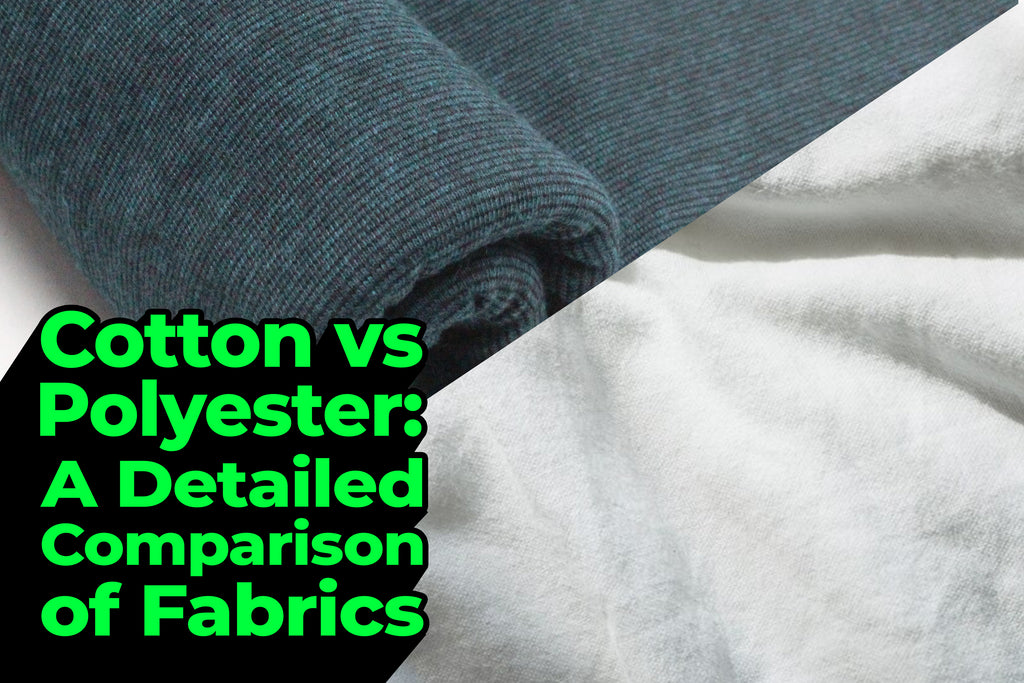Cotton vs Polyester: A Detailed Comparison of Fabrics
Posted by ARTEMIO NERVEZ JR

When it comes to choosing fabric, cotton, and polyester stand out as two of the most popular and widely used materials in the fashion industry. Each fabric has its unique benefits and drawbacks, making it suitable for different uses and preferences. Here's a detailed comparison to help you understand the key differences and decide which might be the better choice for your needs.
Origin and Environmental Impact

- Cotton: Cotton is a natural fiber that comes from the cotton plant. It is biodegradable and renewable. However, its cultivation is water-intensive and often involves a significant use of pesticides, unless it's organic cotton, which has a smaller environmental footprint but is usually more expensive.
- Polyester: Polyester is a synthetic fiber derived from petroleum, making it less environmentally friendly in terms of raw materials. It is not biodegradable, but it does require less water and energy to produce than cotton. Recycled polyester offers a more sustainable alternative by reducing dependency on virgin resources.
Comfort and Wearability

- Cotton: Known for its softness and breathability, cotton is extremely comfortable for daily wear and particularly suitable for hot climates as it allows air circulation and absorbs moisture.
- Polyester: While not as breathable as cotton, polyester is lightweight and has excellent resilience. It can be less comfortable in warm weather but performs well in moist conditions because it dries quickly and resists water.
Durability and Maintenance

- Cotton: Cotton fabrics are durable but tend to wrinkle and shrink with regular washing. They often require more care during laundry, including potential ironing and gentle washing cycles.
- Polyester: Polyester is highly durable and resistant to shrinking, wrinkling, and fading. It is easier to care for than cotton and retains its shape well, making it ideal for athletic wear and other garments that require frequent washing.
Versatility and Usage
- Cotton: Due to its comfort, cotton is preferred for everyday wear, including underwear, t-shirts, and bedding. It's also favored for baby clothing and delicate skin-friendly apparel.
- Polyester: Because of its strength and durability, polyester is often used in outdoor and performance gear. It is also a common choice for professional attire and costumes because it holds dyes well and offers vibrant colors.
Cost
- Cotton: Generally, cotton can vary in price, with organic versions being more expensive. The cost depends on the quality and origin of the cotton.
- Polyester: Typically, polyester is cheaper to produce and therefore often less expensive to purchase, although high-quality or specialty polyester fabrics can be more costly.
Conclusion
The choice between cotton and polyester depends on your specific needs. If you prioritize environmental sustainability and comfort, cotton may be the better choice, particularly if you opt for organic. However, for durability, ease of maintenance, and cost-effectiveness, polyester might be more suitable, especially in recycled forms. Ultimately, blending both fibers can provide a balance of comfort, durability, and sustainability, making it a popular choice for many fabric applications.
At VS Tees, selecting between cotton and polyester hinges on your unique requirements. If your focus is on environmental sustainability and comfort, cotton, especially organic, might be your ideal pick. On the other hand, if you value durability, ease of maintenance, and affordability, polyester, particularly in its recycled variants, could be a better fit. Blending both fibers often achieves a harmonious balance of comfort, durability, and eco-friendliness, making it a favored option for various fabric applications.





